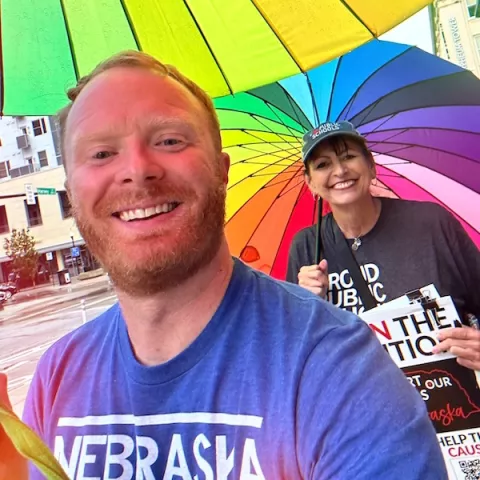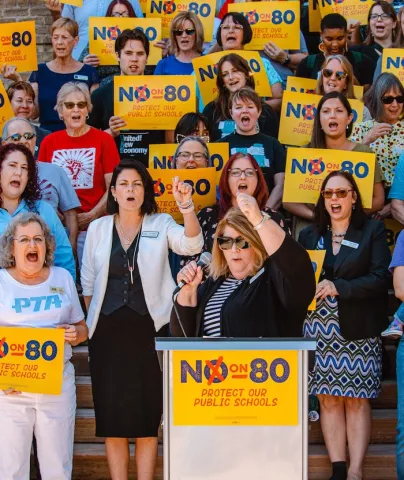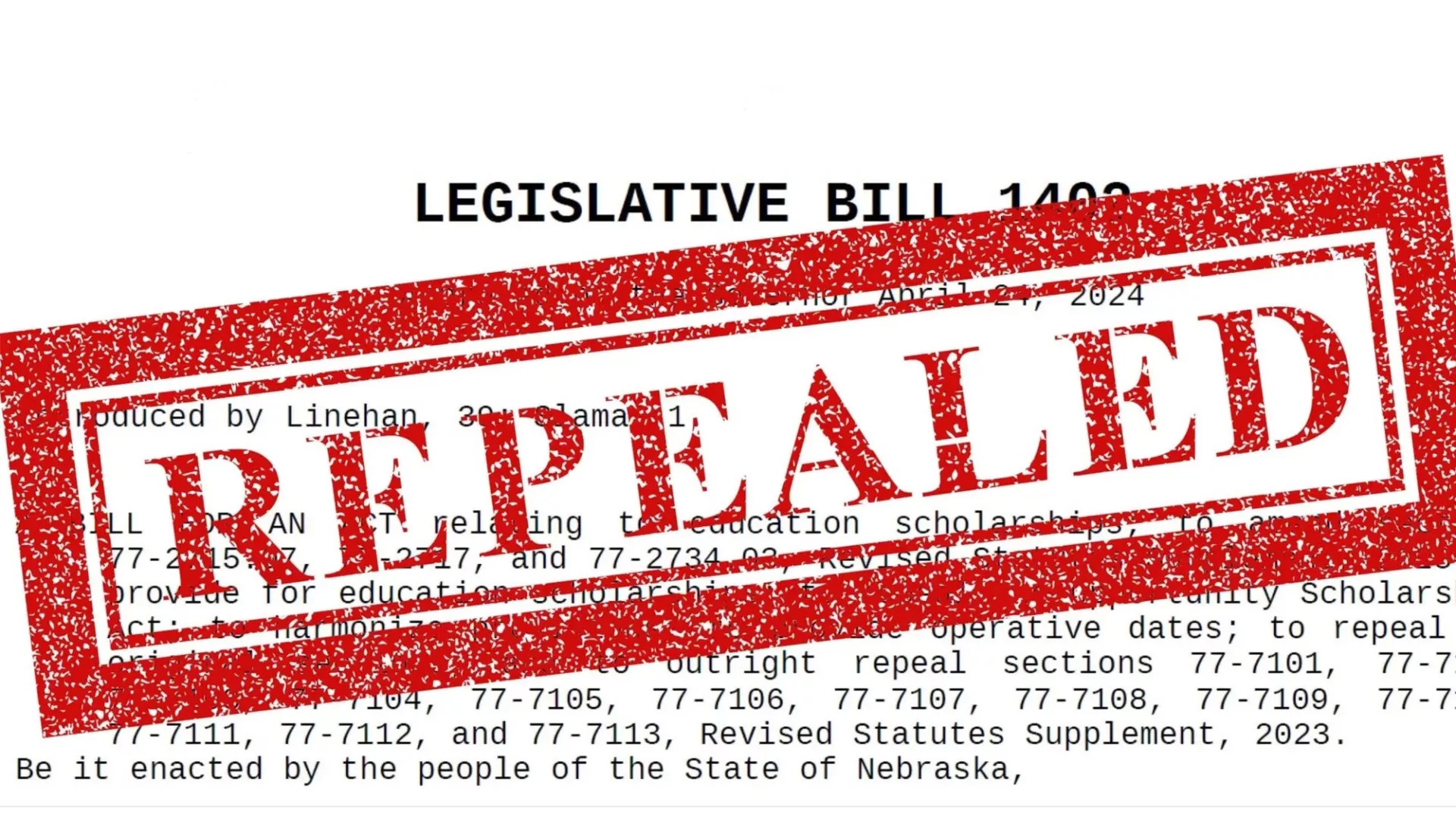
Key Takeaways
- On election day, voters in Nebraska, Colorado, and Kentucky delivered a stunning rebuke to school vouchers.
- A diverse coalition of educators, parents, and community members in each state mobilized to prevent public money from being funneled to private schools.
- These efforts extended a winning streak every public education advocate should celebrate: When school vouchers have been put on the ballot, they have lost every time.
Although the outcome of the 2024 election may test the resolve of the most committed and determined public education advocate, educators and their allies can find strength and inspiration in what happened in Nebraska, Colorado, and Kentucky. In those states, support for public schools was put on the ballot and won a resounding victory.
In ballot initiatives, voters delivered a stunning rebuke to school vouchers, which siphon scarce and critical funding from public schools—which serve 90 percent of students—and redirect it to private institutions with no accountability.
The results weren’t even close.
Nebraskans repealed a voucher law with close to 60 percent of the vote.
Sixty-five percent of Kentucky voters and all 120 counties rejected a constitutional amendment that would have dismantled language in the state constitution that served as a barrier to vouchers.
And, in Colorado, an amendment that sought to enshrine parents’ “right to direct the education of their child” and open the door to vouchers fell far short of the 55 percent needed for passage.
The lesson is loud and clear, said NEA President Becky Pringle.
“Voters rejected diverting public school funding to unaccountable and discriminatory private schools, just like they have done every time vouchers have been on the ballot. The public knows vouchers harm students and does not want them in any form.”
‘We Know What Vouchers Have Done’
Nebraska’s referendum asked voters to repeal or retain a law passed by the Nebraska legislature that would have devoted at least $10 million a year in state funds for “scholarships”—a voucher by any other name— to attend K-12 private or parochial schools. The law would have ended Nebraska’s status as one of the few states in the country that does not authorize either charter schools or vouchers.
Nebraska educators were determined that their state preserve that status. “We know what vouchers have done in other states, including our neighbors,” said retired teacher Rita Bennett of Lincoln, who led many of the petition drives to get the repeal of LB1402 on the November ballot. “We didn't want that for Nebraska.”

In July, the Nebraska State Education Association (NSEA) and their allies in Support Our Schools Nebraska, a diverse coalition of parents, educators, students, and community members, submitted more than 86,000 signatures to the Secretary of State—far more than enough to ensure the issue appeared on the ballot.
The law’s backers attempted to thwart voters’ voice by suing to block the referendum from moving forward, claiming LB1402 was an appropriation and therefore exempt from the provision in the Nebraska Constitution concerning voter referendum rights. They asked the state supreme court to block the measure, which, in a unanimous ruling, refused to do so.
“Nebraskans wanted a vote on this issue,” said Wes Jensen, a high school teacher in Omaha. “Lawmakers just didn't listen, so we had to keep on speaking up and get our voice heard. Since we don't have two legislative bodies in Nebraska, we like to call the people the 'second house.'”
As the election drew closer, educators grew increasingly hopeful as polls showed widespread support for repeal. That optimism was not misplaced. After the votes were counted, repeal won with close to 60 percent of the vote.
“The vote to repeal LB1402’s voucher scheme is a clear directive to the Legislature and the Governor: Nebraskans do not support using public funds to pay for private schools,” said NSEA President Tim Royers. “Elected officials need to respect the wishes of voters and stop trying to impose costly voucher schemes on taxpayers.”
Jensen was not surprised by the lopsided margin. “It didn't matter who I was talking to or what community I was canvassing in. When you asked, ‘do you believe public dollars should stay in public schools,’ the answer was always yes.”
Rewriting State Constitutions
In 2022, the Kentucky Supreme Court ruled that the state constitution required voter approval before public funds may be spent on private schools, overturning a voucher law enacted in 2021.
With that defeat, privatization advocates saw a constitutional amendment as their best and perhaps last hope of making vouchers the law of the land. They successfully placed Amendment 2 on the November ballot, which asked voters to consider changing seven sections of the constitution that served as barriers to allocating tax dollars to students in private schools.
Educators in the state were cautiously optimistic, but polls pointed to a razor thin margin.
Kelly Read, a high school teacher in Boone County and president of the Boone County Education Association, anticipated a higher level of support for the amendment in urban and suburban areas of the state where private schools are more prevalent.
“I thought we would have a much more difficult sell in these communities because vouchers would have put money in the pockets of families whose kids are already enrolled in private schools,” Read said. “Rural families, on the other hand, only have their public school.”
As it turned out, the opposition to the amendment was widespread.

Voters were turned off by the idea of rewriting the state constitution, but also understood that vouchers, to say the least, overpromised and underdelivered for families struggling to make ends meet.
“How is a family who is having a tough time keeping a roof over their heads or food on the table, going to come up with extra money for private school tuition that the voucher does not cover? When we started talking about that, the inequity that vouchers would create, people started listening and responding,” Read said.
Members of the Kentucky Education Association engaged in grassroots advocacy in every school district and county across the commonwealth, educating the public about the dangers posed by Amendment 2.
On election day, the amendment failed by a 30-point margin.
In Colorado, voters similarly turned down Amendment 80, which by enshrining the “individual right to school choice” would have opened the door to school vouchers. The amendment needed 55 percent to pass, but, thanks to the advocacy of the Colorado Education Association (CEA) and its allies in the No on 80 campaign, voters rejected it outright.
Recognizing the unpopularity of school vouchers, Amendment 80 backers insisted that the measure was not tied to any specific policy or future legislation.
Colorado voters, said CEA President Kevin Vick, knew better.
“They saw this for what it really was—a duplicitous measure that would have opened the door for a voucher system that would have done irreversible damage to public education in our state. Public schools in Colorado serve 95% of students, and they must be protected from those who would attempt to dismantle them for profit.”
‘We’ll Be Ready’
The overwhelming results in Colorado, Nebraska, and Kentucky extended a winning streak every public education advocate should celebrate: When school vouchers have been put on the ballot, they have lost every time. Voters choose to support children and support strong public schools.
Will lawmakers finally get the message?
“Well, I hope that our state legislature takes notice as they get back to work in 2025,” said Wes Jensen in Nebraska. “But we know there is lot of power and money invested in these voucher programs. If we need to do this again, take our case to the people, we’ll be ready to stand and fight for public education.”
